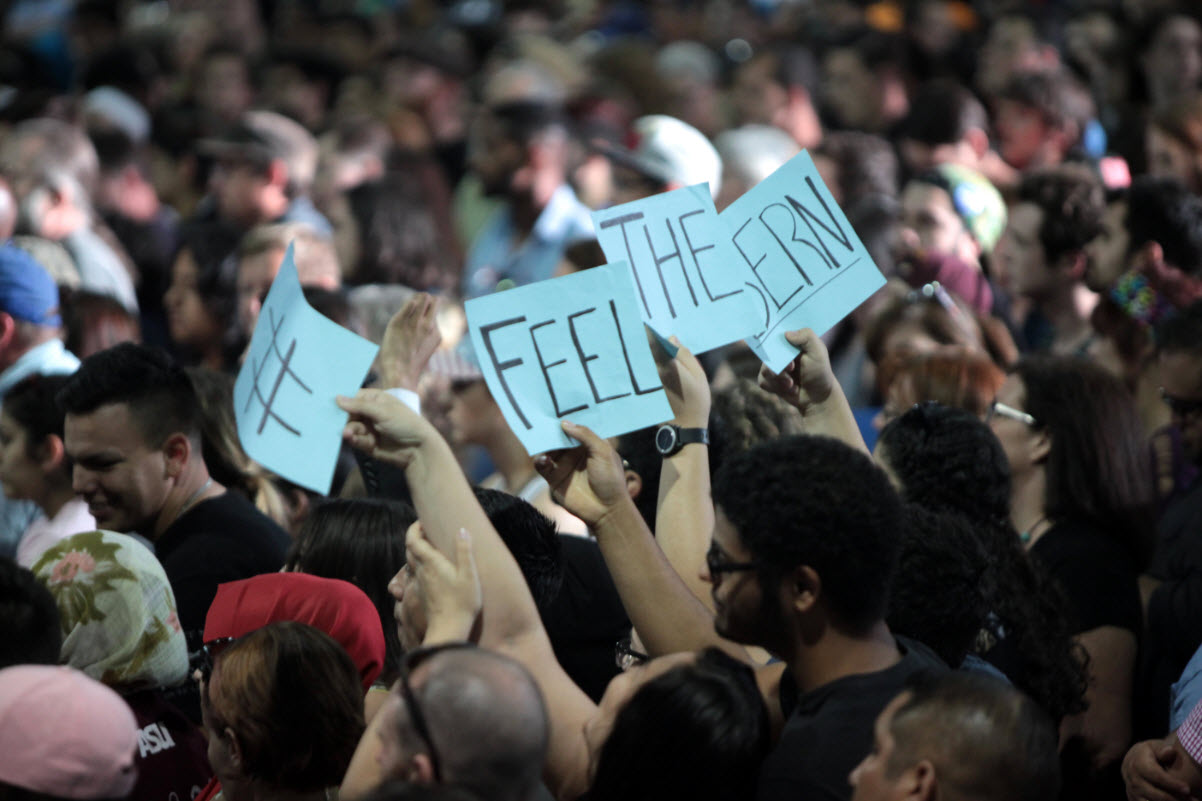
Or die trying.
ABOUT 25% OF BERNIE SANDERS SUPPORTERS have expressed refusal to vote for Hillary Clinton in November — whether that means voting third party, writing Sanders in, or just staying home. The “Bernie or Bust” crowd has reinvigorated a conversation about the motivations behind and the consequences of “protest voting” that were common surrounding the presidential bids of Ralph Nader in 2000 and 2004. Only this time, the candidate in question has a much larger voter base.
In response to the Busters, several op-eds have featured the criticism that they are acting on privilege; only people with privilege – mostly white men, and especially the affluent ones – are in a position to enable a Republican to take office by refusing to vote for the Democratic candidate. Only those who don’t stand to incur immediate harm, and only those who are indifferent to the immediate harm incurred by others, would take such a position.
I think it’s a little more complicated than that.
First, the assumption that Bernie or Busters are almost exclusively white and male fits into the dominant narrative that Sanders largely lacks support from other demographics, a narrative that is not quite accurate. A McClatchy-Marist poll from the end of March found that women were split almost evenly between Clinton and Sanders (though many other polls find Clinton with a more substantial lead among women), and 63% of Latinos supported Sanders, compared to 31% for Clinton. Among all non-white respondents, Sanders had 51% support to Clinton’s 44%.
More to-the-point, this poll also offered a demographic breakdown of Sanders supporters who would not support Clinton in November if she is the nominee. Among white respondents, 30% said they would not do so; 18% of non-white respondents said the same; 30% of men said they would not, compared to 22% of women.
Yes, whites and men make up most of these Busters, but the group is far from a monolith.
Of course, privilege comes in many forms. But there are reasons beyond privilege that a person might refuse to vote for Clinton.
Many of the arguments I’ve encountered in favor of protest voting, and that I have put forward myself throughout my third-party voting years, hinge on principle: voting one’s conscience, voting based on whom one actually believes in as opposed to against whom one fears, refusing to turn one of the most fundamental political acts, a representation of one’s voice and will, into a strategic compromise.
This year more than ever before, I’m aware of what’s at stake for LGBT individuals, people of color, people experiencing poverty, women, and people abroad. I can no longer remain in that lofty, principled realm of justification in which I was so comfortable until now, this “ought” that leaves the “is” unconsidered. I’m confronting the possibility that my protest – the Busters’ collective protest – if Clinton is the nominee could result in immediate harm to the people whose needs and interests are front and center in the progressive agenda.
The concrete must be reckoned with. But, in turn, I think only focusing on short-term consequences causes us to lose sight of the principle, and that losing sight of principle has its own consequences, mostly long-term, for the underprivileged. The strategic move to elect the least harmful candidate yields short-term results. Results, yes – but tempered by the dominant interests that have always influenced policy against what is best for the vast majority of people. Small results. And those small progressive gains are susceptible to easy reversal should the next incumbent or Congress — or both — challenge them.
A President Clinton would protect reproductive rights. She might work to further LGBT protections, or at least not against them. She might work for criminal justice reform. She might make things a little easier for those of us scraping by, or at least not worse. She probably won’t make things better, and might make them worse, for the recipients of our drone strikes and regime-change-destabilization abroad.
That’s probably a lot more than we can expect from one of our Republican candidates. And incremental progress is better than none at all.
But if we continue to capitulate to the short-term-small-potatoes-strategy game, I’m afraid we’re enabling it. We’re enabling the Democratic Party to persist in its established tack, largely ignoring the demands of progressives for continued, uncompromised allegiance to previously-neglected needs and interests. And that leaves the underprivileged vulnerable not just for the next four to eight years, but for as long as we tell the party that we’ll fall in line with it. Playing the strategy game allows it to continue to exist. Refusing to play the game could force the progressive agenda to be adopted more meaningfully than ever.
As I said above, Busters aren’t a monolith. Privilege is likely part of the reason why whites (like myself) and men are more likely to say they won’t vote for Clinton than women (like myself) or people of color. But there are other reasons for such refusal, ones founded on the interests and needs of marginalized groups rather than neglectful of them. I’m not convinced that voting for Clinton is inherently less harmful than not doing so, when taking into account not only short-term speculations, but long-term ones as well. Perhaps many of the Busters feel the same way.
Disenchanted voters who don’t want to play the “lesser-of-two-evils” games, but also don’t want to contribute to the “spoiler effect,” should consider getting in on VotePact. The idea behind the initiative is to pair disenchanted voters from the right and left who agree to both vote independent or third-party. This takes one vote away from both the Democratic and Republican nominee, so one side is not disproportionately disadvantaged. The initiative is young, and there’s no system in place to match people up, but keep an eye on its development, particularly if the nominee is not the one you want. It’s one way to vote on principle, send the party a message, and avoid contributing to immediate harm.
















